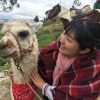Interest in learning another language attracts a diverse set of students from a variety of backgrounds. To learn more about these students, their reasons for studying a language, and how language learning helped their post-graduation careers, check out the selection of alumni profiles below.

Agatha Tan Qian Yu
Class of 2020
About
Language(-s) studied: Japanese
Why did you decide to study a language at Yale-NUS?
Yale-NUS makes studying languages incredibly easy! When I was studying Japanese, Registry handled all the administrative matters with the NUS Centre for Language Studies and negotiated to get me into the class sections I wanted. There are also many opportunities to develop language mastery at Yale-NUS, from weekly language tables to summer language scholarships. I actually received one of these scholarships and spent the summer after my first year studying Japanese in Kanazawa City through the Princeton in Ishikawa programme! Not availing myself of any of these countless opportunities would have honestly felt like a waste.
What advantage do you see in learning this language for your plans after graduation?
From this September, I will be participating in the Japan Exchange and Teaching (JET) Programme as a Coordinator for International Relations (CIR)! I have actually been posted to another city in Ishikawa, so I am excited to return and explore the prefecture further. CIRs require N2-level Japanese, so I knew I needed to pursue Japanese further in college. And after JET, who knows? Knowing Japanese seems like it will open many doors. Hopefully also one in video game translation, which is something I think I would also like to pursue!
What made you choose your particular language of study?
It was an easy choice for me: I had studied Japanese in secondary school but not in junior college, and I knew I wanted to pick it up again in university. I have been interested in Japan since I was in primary school—as with many others, my interest started with anime and manga, and later expanded to video games and art. And though I have now accomplished my childhood goal of being able to (roughly) understand a wide range of Japanese media, what I enjoy most about knowing Japanese is that it allows me to connect with people from an entirely different culture. I have met many Japanese locals keen to share parts of their home with me, and it has been heartening to be able to reciprocate!

Suyeon Lee
Class of 2021
About
Languages studied: Arabic, Spanish
Why did you decide to study a language at Yale-NUS?
Learning new languages is my favourite self-care pastime. Learning Spanish at Yale-NUS was one of the best experiences throughout my college years. I made good friends in class chatting about random topics, making silly mistakes, and growing together. The programme here makes sure that we have the maximum exposure to the language through creative assignments and tutoring. I had an amazing tutor, who inspired me to become one as well! Also, there are plenty of experiential learning opportunities that you can join to enhance the cultural understanding of the language.
What advantage do you see in learning this language for your plans after graduation?
In the long-term, I want to work with refugees, many of whom come from Southwest Asia (Middle East). Being able to communicate with them in a language that they feel comfortable in would be a great asset working in this field. The same goes for Spanish! But at the end of the day, languages are fun to learn even without all these career-related advantages. It is just great to have a passion to pursue no matter where I am!
What made you choose your particular language of study?
I learned Spanish before coming to college, so I wanted to continue building on it. Also, my semester abroad was in Jordan, so I took Arabic 1 at the NUS Centre for Language Studies to familiarise myself with the Arabic script and basics before moving to Amman!

Dylan Cotter
Class of 2021
About
Language(-s) studied: Chinese
Why did you decide to study a language at Yale-NUS?
The accessibility of the courses offered me a feasible way to continue the study of Chinese, which I had already undertaken for four years in high school. Moreover, being in Singapore naturally gave me extra incentives to study the language, considering the many ways in which I can practice it outside the classroom.
What advantage do you see in learning this language for your plans after graduation?
As I started considering my future career path, I noticed how many employers give priority to people who can speak at least one other East Asian language. The same pattern applies to many of the internships I am interested in. For this reason, it is fundamental for me to master conversational Chinese and be able to count on this language even in the workplace.
What made you choose your particular language of study?
I have a personal interest in China as a country and in the Chinese language. In fact, this was a determining factor in my decision to enroll in Yale-NUS in the first place. Having already studied this language for many years prior to the start of my four years here at the College, it seemed natural and logical for me to deepen my knowledge of this language, instead of starting a new one.

Ilya Katrinnada Binte Zubaidi
Class of 2018
About
Language(-s) studied: Hindi
Why did you decide to study a language at Yale-NUS?
As an Anthropology major, I am interested in learning more about different cultures and I think that learning a new language is a good way to do so.
What advantage do you see in learning this language for your plans after graduation?
I would be able to better connect with people when travelling, and it might also open new opportunities for me if I decide to work overseas.
What made you choose your particular language of study?
I spent a semester in the Indian Himalayas on a study abroad programme with Pitt in the Himalayas. There, I picked up simple Hindi phrases and was awed by how bits of it overlapped with my mother tongue (Malay) as well as Arabic. Also, since I figured that I would be travelling to India again one day, I decided to learn it while the opportunity was still available.




